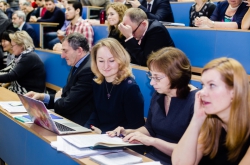The new concept was presented by Nikolai Mikhailov, ITMO's Vice Rector for Education. He strongly believes that competition is the main drive for improvement, so his idea is creating a competitive environment at the university.
«As I someone who has experience in business, this is the only solution I believe in. To improve the quality of a product or a service, one has to turn to internal competition. It's the law of economics, the law of life — it works anytime, everywhere. That's a necessary requirement, though in our case, it's still insufficient», — shares Mr. Mikhailov.
 ITMO University. Nikolai Mikhailov
ITMO University. Nikolai Mikhailov
To achieve this goal, electivity is to be promoted on all levels of the educational process. Some electivity elements are already used at ITMO: students can choose between different programs and disciplines that are part of their course. The further development of this approach implies the opportunity to choose between disciplines and lecturers, for both students and those who design the program — and that will result in lots of changes. This way, the departments will lose their role as the core of educational processes, and will be replaced by flexible educational programs. Special teams that research the demand, monitor these programs and organize practical training sessions and the like. This implies a totally new approach to elaborating schedules, and a new project approach to educational activity as a whole — these programs will become more of personal projects of their heads. The latter will pick particular lecturers for courses and disciplines and make all relevant decisions. Also, there will be a need for a new quality assessment system that involves everyone — administration, lecturers, students.
«Orders and instructions don't always bring results — so we have to use the economic inducement for increasing the quality of education. What’s more, to follow the project-based approach to education, we might have to eliminate the department structure. Still, we discuss different models, and I don't want anyone to think that we are set on doing that», — underlines the Vice Rector for Education.
 Academic Board of ITMO University.
Academic Board of ITMO University.
Mr. Mikhailov also notes that most of the department's functions will go to educational programs — those will deal with things like academic degrees and everything related to science; those department heads that won't work on elaborating new educational programs will become heads of their own laboratories. Still, this reforms concept isn't some novelty — it only systematizes the ideas that have been used or put forward at ITMO for quite a long time. In essence, it's all based on the same principles of market orientation, student orientation, openness and module-based education.
As of now, the Academic Board approved of the approaches and ideas presented by Mr. Mikhaivol. Now, ITMO's academic staff is to work on checking the single elements of the project, assessing the costs and elaborating the necessary road maps.




